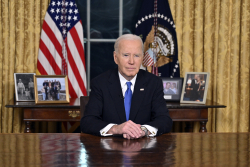Without strong leadership in Islamabad, with passions running high, and with foreign powers actively pouring gasoline on the fire, all signs point toward further escalation.
Wars are often defined by the arrogance, ignorance, and miscalculations of the warring parties. This seems to be true of the present India-Pakistan conflict.
On the heels of a vicious Islamist terrorist attack directed against Indian citizens in the contested Kashmir region on the subcontinent, the government in New Delhi demanded that Pakistan help to bring to justice the Islamist elements living in Pakistan who were involved in the attack. After the Pakistani government denied any involvement, New Delhi initiated “Operation Sindoor,” a series of retaliatory strikes targeting militant activity inside Pakistan.
India’s Air Force Is Not Prepared for Major War
Operation Sindoor was initiated on May 6-7. In the run-up to the clash—which was widely predicted, given the longtime animosity between the two nations and the demand within India for a vigorous response to the Kashmir attack—India was perceived as having the upper hand over the Pakistanis. In many respects, they do have the advantage. India’s nuclear command-and-control capabilities are superior to those of the Pakistanis. India has a varied set of equipment from both various European contractors as well as the Russians.
But the Pakistanis have proven their mettle. Armed with top Chinese equipment, and with military assistance provided by the Turks, Islamabad has shown itself to be more than capable of rebuffing at least the initial wave of Indian air attacks. The Pakistanis shot down a total of five Indian Air Force (IAF) warplanes at the start of Operation Sindoor, after all.
But the conflict is still at its opening phases. The Indians have already hit back earlier on Thursday, targeting key Pakistani air defenses.
When it comes to the IAF, contrary to what many in the West had assumed, the chronic pilot shortages and lack of appropriate flight training simulators has had a negative impact on the fighting prowess of the IAF. The Rafale fighters that India lost were among some of the IAF’s most advanced systems. Losing them is a blow to New Delhi’s prestige. More importantly, it sends a dangerous warning that the Indians cannot assume superiority in their engagements with the Pakistani Air Force.
Sophie Landrin of Le Monde speculates that the reason behind the Pakistan Air Force’s success against the Indians in the initial phases of the campaign has to do with the superior training and combat experience of most Pakistani Air Force pilots. After all, they’ve been fighting continuous counterterrorism air campaigns in their Federally Administered Tribal Area (FATA) along the border with Afghanistan, whereas India has largely remained at peace.
The Geopolitics of the India-Pakistan War
It’s important to understand why New Delhi has lashed out at their Pakistani neighbors. That goes back to the terrorist attack in Kashmir. Indian intelligence claimed to have found links between Lashkar-e-Taiba (LeT), the terrorist network responsible for the Kashmir attacks on April 22, and the Inter-Service Intelligence (ISI), Pakistan’s notorious intelligence agency widely regarded as a “state within a state” in that country.
As an interesting aside, LeT was responsible for the horrific 2008 Mumbai terrorist attacks as well.
The complicating factors here are twofold. First, though India has raged against Pakistan and the ISI—and though the Pakistani intelligence agency’s culpability seems obvious—Islamabad has denied New Delhi’s claims, and it appears that the Indians lack concrete evidence supporting it.
Second, and more alarmingly for India, Pakistan has spent a great deal of time preparing for such a conflict by enhancing its ties with multiple regional powers—notably China. It has also used its alliance with Turkey, a fellow Islamist regime, to enhance its defensive capabilities. Today, the Turkish Navy has deployed at least one anti-submarine warfare (ASW) warship to Pakistani waters.
Neither Turkey nor China wants to see a victorious India. China is a regional rival to India. What’s more, the Chinese and Indian economies are deadlocked in serious competition with each other. And both India and China have been engaged in a tense standoff for control over the Ladakh area along the border separating China and India. Predictably, China is looking to weaken India’s otherwise strong stance in that area. The ongoing war allows for this to occur.
As for the Indian side, New Delhi’s non-alignment in international affairs has limited its international support. India was instrumental in the formation of the “Quad” alongside the United States, Australia, and Japan, but that alliance has limited military relevance—mostly at New Delhi’s request. India’s longer-term allies, the Russians, have remained decidedly ambivalent about the whole affair on the subcontinent. This is likely because of Russia’s own “friendship without limits” with Beijing.
Both India and Pakistan Have Reasons to Escalate the War
Ultimately, neither the Indian nor the Pakistani governments are capable of resolving the conflict on its own. Left to their own devices, the two warring parties will likely continue up the escalation ladder—aided by political turmoil in both countries, the need to present their leaders as strong, and the usefulness of a foreign foe in rallying public support.
Without strong leadership in Islamabad, with passions running high, and with foreign powers actively pouring gasoline on the fire, all signs point toward further escalation. The only parties capable of resolving this conflict are the United States, which has leverage over Pakistan—and the Russian Federation, which has sway with India.
Here, again, is a strategic window through which both Russia and the United States can repair their wounded relationship, and work together to stabilize the crisis on the subcontinent. Leveraging its newfound relationship with Moscow, Washington could ensure that Beijing and Ankara helped to ameliorate the conflict as well. But until that happens, the subcontinent will continue its descent towards an apocalyptic war..
About the Author: Brandon J. Weichert
Brandon J. Weichert, a Senior National Security Editor at The National Interest as well as a contributor at Popular Mechanics, who consults regularly with various government institutions and private organizations on geopolitical issues. Weichert’s writings have appeared in multiple publications, including the Washington Times, National Review, The American Spectator, MSN, the Asia Times, and countless others. His books include Winning Space: How America Remains a Superpower, Biohacked: China’s Race to Control Life, and The Shadow War: Iran’s Quest for Supremacy. His newest book, A Disaster of Our Own Making: How the West Lost Ukraine is available for purchase wherever books are sold. He can be followed via Twitter @WeTheBrandon.
Image: Shutterstock / SumanBhaumik.














